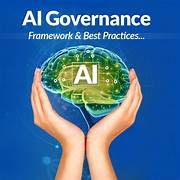AI Governance: Frameworks for Ethical Machine Decision-making
As artificial intelligence (AI) continues to transform industries and reshape societal norms, the importance of ethical governance in AI decision-making grows increasingly urgent. AI systems are now being entrusted with tasks that directly impact lives, such as autonomous driving, healthcare diagnostics, and financial transactions. To ensure these systems operate responsibly and equitably, robust governance frameworks are essential.
This article explores the core principles, challenges, and emerging frameworks for ethical AI governance, highlighting the path toward accountable and transparent machine decision-making.
The Need for AI Governance
AI governance encompasses the policies, practices, and frameworks designed to guide the ethical development, deployment, and oversight of AI systems. It aims to address the risks associated with AI, including bias, lack of transparency, and potential misuse, while fostering innovation and trust.
As AI systems grow more autonomous, their decisions can have far-reaching consequences. For example, in hiring processes, biased algorithms may perpetuate discrimination. Similarly, in healthcare, errors in AI diagnostic tools could lead to life-threatening consequences. Governance frameworks aim to mitigate such risks by ensuring AI aligns with human values and societal goals.
Principles of Ethical AI Governance
1. Transparency
AI systems should operate transparently, providing clear explanations of their decision-making processes. Explainable AI (XAI) techniques are crucial for building trust and enabling human oversight.
2. Accountability
Developers, organizations, and users must be accountable for the actions and outcomes of AI systems. Clear accountability structures ensure responsibility for addressing errors or misuse.
3. Fairness
AI systems should be free from biases that could lead to unfair outcomes. This requires careful data selection, algorithm design, and ongoing monitoring.
4. Privacy
AI governance must protect individual privacy by adhering to data protection regulations and implementing secure data management practices.
5. Safety and Security
AI systems must be designed and deployed with safeguards against malicious attacks and unintended harm, ensuring their reliability and resilience.
6. Human-Centric Design
AI should augment human capabilities rather than replace them. Human-centric design prioritizes user needs and ethical considerations in AI development.
Challenges in AI Governance
1. Defining Ethical Standards
Ethical norms vary across cultures and contexts, making it difficult to establish universal standards for AI governance.
2. Regulatory Lag
The rapid pace of AI innovation often outstrips the development of regulations, leaving gaps in oversight and accountability.
3. Bias and Fairness
AI systems trained on biased data can perpetuate or amplify inequalities. Addressing this requires continuous monitoring and intervention.
4. Transparency vs. Complexity
Many AI systems, especially those using deep learning, operate as black boxes, making it challenging to explain their decisions.
5. Global Coordination
AI governance requires international collaboration to address cross-border issues such as data sharing, cybersecurity, and ethical standards.
Emerging Frameworks for AI Governance
1. Guidelines from International Organizations
Organizations like the OECD and UNESCO have proposed ethical principles for AI. For instance, UNESCO’s Recommendation on the Ethics of Artificial Intelligence emphasizes inclusivity, accountability, and environmental sustainability.
2. Regulatory Initiatives
Governments worldwide are enacting AI-specific regulations. The European Union’s AI Act, for example, categorizes AI systems by risk level and imposes requirements on high-risk applications.
3. Industry Standards
Tech companies are adopting internal ethical guidelines and establishing AI ethics boards to oversee their technologies. For example, Google’s AI Principles emphasize fairness, accountability, and privacy.
4. Independent Oversight Bodies
Independent organizations, such as the AI Now Institute, advocate for ethical AI practices and conduct research to inform policy decisions.
5. Collaborative Frameworks
Public-private partnerships, like the Partnership on AI, bring together stakeholders to promote responsible AI development and deployment.
Best Practices for Ethical AI Governance
1. Stakeholder Involvement
Engage diverse stakeholders, including policymakers, technologists, ethicists, and affected communities, in the governance process.
2. Continuous Monitoring
Implement mechanisms for ongoing evaluation of AI systems to identify and address ethical risks throughout their lifecycle.
3. Transparent Reporting
Organizations should publicly disclose information about their AI systems, including objectives, data sources, and performance metrics.
4. Ethics Training
Provide ethics training for AI developers and users to raise awareness of ethical considerations in AI design and implementation.
5. Incorporate Human Oversight
Ensure that humans remain in the loop for critical decisions, particularly in high-stakes applications like healthcare and criminal justice.
Future Directions in AI Governance
1. Adaptive Regulations
Regulatory frameworks must evolve alongside AI advancements to address emerging risks and opportunities effectively.
2. Standardization
Developing international standards for AI governance will facilitate consistency and interoperability across jurisdictions.
3. AI Ethics Research
Investing in interdisciplinary research will enhance our understanding of ethical challenges and inform better governance practices.
4. AI Auditing Tools
Advanced tools for auditing AI systems will help organizations assess compliance with ethical guidelines and regulatory requirements.
5. Citizen Participation
Incorporating public input into AI governance will ensure that policies reflect societal values and priorities.
Conclusion
AI governance is pivotal in ensuring that artificial intelligence systems operate ethically, transparently, and in alignment with human values. By addressing challenges such as bias, accountability, and regulatory gaps, robust governance frameworks can foster trust and innovation. Through international collaboration, stakeholder involvement, and adaptive policies, the future of AI governance holds the promise of guiding AI technologies toward a more equitable and responsible trajectory.


